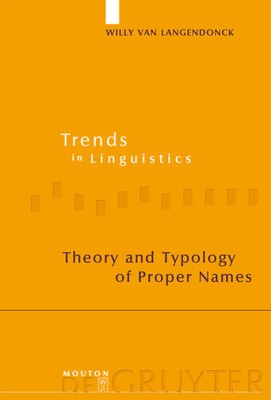
- We will send in 10–14 business days.
- Author: Willy Van Langendonck
- Publisher: Walter de Gruyter
- Year: 2007
- ISBN-10: 3110190869
- ISBN-13: 9783110190861
- Format: 16.5 x 23.4 x 2.6 cm, hardcover
- Language: English
- SAVE -10% with code: EXTRA
Reviews
Description
This book proposes a new synthesis of the functions of proper names, from a semantic, pragmatic and syntactic perspective. Proper names are approached constructionally, distinguishing prototypical uses from more marked ones such as those in which names are used as common nouns. Since what is traditionally regarded as 'the' class of names turns out to be only one possible function of name-forms (though a prototypical one), the notion of 'proprial lemma' is introduced as the concept behind both proprial and appellative uses of such categories as place names and personal names. New formal arguments are adduced to distinguish proper name function from common noun or pronoun function.
The special status of proper names is captured in a unified pragmatic-semantic-syntactic theory: a proper name denotes a unique entity at the level of langue to make it psychosocially salient within a given basic level category. The meaning of the name, if any, does not determine its denotation. An important formal reflection of this characterization of names is their ability to appear in such close appositional constructions as the poet Burns or Fido the dog. The neurolinguistic finding that proper names constitute a separate category is introduced and interpreted within a general linguistic frame of reference. The different kinds of meanings associated with names (categorical, associative, emotive, and grammatical) are shown to be presuppositional in nature. In addition, the book proposes an entirely new classification of proper names as forming a continuum ranging from prototypical (personal and place names) to nonprototypical categories (brand and language names) to citations and autonyms, and a new diachronic classification of family names and nicknames.
This book fills an important gap in the current literature, because the most recent linguistic book in English on name theory dates back to 1973. It is explicitly interdisciplinary, taking into account linguistic, philosophical, neurolinguistic, sociolinguistic and dialect geographical aspects of proper names.
EXTRA 10 % discount with code: EXTRA
The promotion ends in 10d.01:49:40
The discount code is valid when purchasing from 10 €. Discounts do not stack.
- Author: Willy Van Langendonck
- Publisher: Walter de Gruyter
- Year: 2007
- ISBN-10: 3110190869
- ISBN-13: 9783110190861
- Format: 16.5 x 23.4 x 2.6 cm, hardcover
- Language: English English
This book proposes a new synthesis of the functions of proper names, from a semantic, pragmatic and syntactic perspective. Proper names are approached constructionally, distinguishing prototypical uses from more marked ones such as those in which names are used as common nouns. Since what is traditionally regarded as 'the' class of names turns out to be only one possible function of name-forms (though a prototypical one), the notion of 'proprial lemma' is introduced as the concept behind both proprial and appellative uses of such categories as place names and personal names. New formal arguments are adduced to distinguish proper name function from common noun or pronoun function.
The special status of proper names is captured in a unified pragmatic-semantic-syntactic theory: a proper name denotes a unique entity at the level of langue to make it psychosocially salient within a given basic level category. The meaning of the name, if any, does not determine its denotation. An important formal reflection of this characterization of names is their ability to appear in such close appositional constructions as the poet Burns or Fido the dog. The neurolinguistic finding that proper names constitute a separate category is introduced and interpreted within a general linguistic frame of reference. The different kinds of meanings associated with names (categorical, associative, emotive, and grammatical) are shown to be presuppositional in nature. In addition, the book proposes an entirely new classification of proper names as forming a continuum ranging from prototypical (personal and place names) to nonprototypical categories (brand and language names) to citations and autonyms, and a new diachronic classification of family names and nicknames.
This book fills an important gap in the current literature, because the most recent linguistic book in English on name theory dates back to 1973. It is explicitly interdisciplinary, taking into account linguistic, philosophical, neurolinguistic, sociolinguistic and dialect geographical aspects of proper names.


Reviews